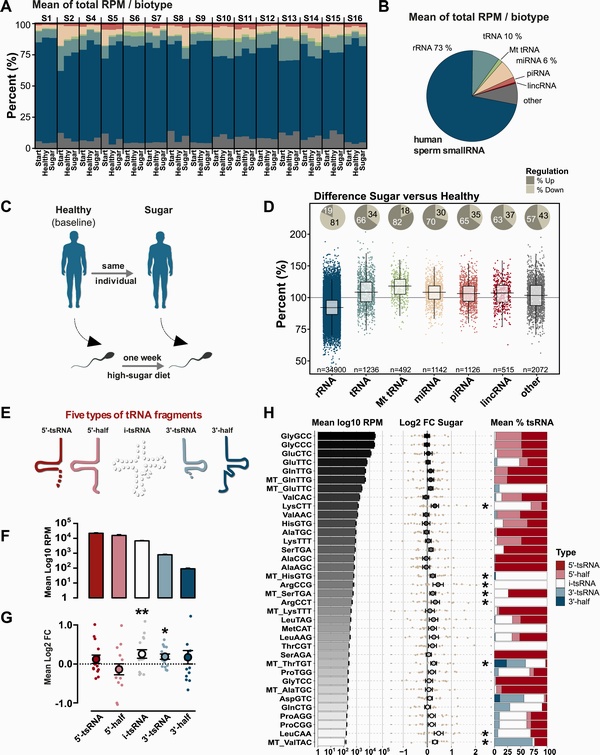The concern is that such epigenetic changes might be able to lead to properties being transferred from a parent to offspring via the sperm or the egg.
This pilot study in humans followed a study of male fruit flies which had consumed excess sugar shortly before mating more often produced offspring who became overweight. Similar studies on mice have suggested that small fragments of RNA known as tsRNA play a role in these epigenetic phenomena that appear in the next generation. These RNA fragments are present in unusually large amounts in the sperm of many species, including humans, fruit flies and mice. So far, their function has not been examined in detail. Scientists have speculated that the RNA fragments in sperm may be involved in epigenetic phenomena, but it is too early to say whether this is the case in humans. The new study was initiated by the researchers to investigate whether a high consumption of sugar affects the RNA fragments in human sperm.

Credit: http://dx.doi.org/10.1371/journal.pbio.3000559
The human study examined 15 normal, non-smoking young men, who followed a diet in which they were given all food from the scientists for two weeks. The diet was based on the Nordic Nutrition Recommendations for healthy eating with one exception: during the second week the researchers added sugar, corresponding to around 3.5 liters of fizzy drinks, or 450 grams of confectionery, every day. The sperm quality and other indicators of the participants' health were investigated at the start of the study, after the first week (during which they ate a healthy diet), and after the second week (when the participants had additionally consumed large amounts of sugar).
At the beginning of the study, one third of the participants had low sperm motility. Motility is one of several factors that influence sperm quality, and the fraction of people with low sperm motility in the study corresponded to that in the general population. The researchers were surprised to discover that the sperm motility of all participants became normal during the study.
"The study shows that sperm motility can be changed in a short period, and seems to be closely coupled to diet. This has important clinical implications. But we can't say whether it was the sugar that caused the effect, since it may be a component of the basic healthly diet that has a positive effect on the sperm," says Anita Öst, senior lecturer in the Department of Clinical and Experimental Medicine at Linköping University.
The researchers also found that the small RNA fragments, which are linked to sperm motility, also changed. They are now planning to continue the work and investigate whether there is a link between male fertility and the RNA fragments in sperm. They will also determine whether the RNA code can be used for new diagnostic methods to measure sperm quality during in vitro fertilization.
Citation: Nätt D, Kugelberg U, Casas E, Nedstrand E, Zalavary S, Henriksson P, et al. (2019) Human sperm displays rapid responses to diet. PLoS Biol 17(12): e3000559. https://doi.org/10.1371/journal.pbio.3000559




Comments